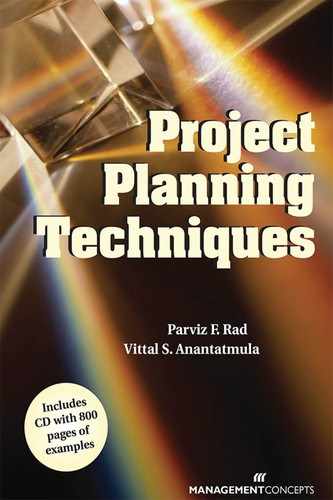Bibliography
Anantatmula, V. “Criteria for Measuring Knowledge Management Efforts in Organizations.” UMI Dissertation Services (3123064). Ann Arbor, MI: ProQuest, 2004.
Anbari, F. T. Quantitative Methods for Project Management. New York: International Institute for Learning, 1997.
Anonymous. A Guide to the Project Management Body of Knowledge (PMBOK®). Sylva, NC: Project Management Institute, 2000.
Anonymous. Parametric Estimating Handbook. 2d ed. Washington, D.C.:U.S. Department of Defense, Spring 1999.
Anonymous. Richardson’s Plant Cost Estimating Standards. Mesa, AZ: Richardson, 1998.
Anonymous. RS Means Construction Reference. Kingston, MA: RS Means Construction Reference Books, 2000.
Anonymous. Skills and Knowledge of Cost Engineering. 4th ed. Morgantown, WV: AACE, September 1999.
Anonymous. NASA Cost Estimating Handbook. Washington, D.C.: NASA HQ, 2002.
Baker, J. “Cost/time trade-off analysis for the critical path method: A derivation of the network flow approach.” Journal of the Operational Research Society 48, no. 12 (December 1997): 1241–1244.
Cioffi, D. Managing Project Integration. Vienna, VA: Management Concepts, 2002.
DeNeufville, R., and E. Hani. “Bidding models: Effects on bidders’ risk aversion.” ASCE Journal of the Construction Division 103, no. CO1 (March 1977) 57–70.
Foldes, Stephen, and François Soumis, “PERT and crashing revisited: Mathematical generalizations.” European Journal of Operational Research 64, no. 2 (January 22, 1993): 286–294.
Garvin, D. Learning in Action. Boston, MA: Harvard Business School Press, 2000.
Gates, Marvin. “Bidding Model—A Monte Carlo experiment.” ASCE Journal of the Construction Division 102, no. 4 (December 1976): 669–680.
Gates, Marvin. “Review of existing and advanced construction estimating techniques.” Proceedings of 1978 Conference on Construction Estimating and Cost Control Methods. New York: ASCE Construction Division, 1978.
Gates, Marvin, and Amerigo Scarpa. “Optimum working time.” Transportation Engineering Journal 103, no. 4 (November 1977): 773–781.
Gates, Marvin, and Amerigo Scarpa. “Reward-risk ratio.” ASCE Journal of the Construction Division 100, no. 4 (December 1974): 521–532.
Gould, Frederick E. Managing the Construction Process: Estimating, Scheduling, and Project Control. New York: Wiley, 1996.
Gray, C.F., and E.W. Larsen. Project Management: The Managerial Process. 2nd ed. New York: McGraw-Hill, 2003.
Hall, E., and J. Johnson. Integrated Project Management. Columbus, OH: Prentice Hall, 2003.
Ibbs, C.W., and Y.H. Kwak. The Benefits of Project Management: Financial and Organizational Rewards to Corporations. Sylva, NC: PMI® Publications, 1997.
Jandy, G., and K.Tanczos. “Network scheduling limited by special constraint as a function of time cost.” Periodica Polytechnica Transportation Engineering 15, no. 2 (1987): 35.
Kerr, Richard A. “A system fails at Mars, a spacecraft is lost.” Science 286 (November 19, 1999): 1457–1459.
Kerzner, H. Project Management: A Systems Approach to Planning, Scheduling, and Controlling. 6th ed. New York: John Wiley & Sons, Inc., 1998.
Kerzner, H. Applied Project Management: Best Practices on Implementation. New York: John Wiley & Sons, 2000.
Klastorin, T. Project Management: Tools and Trade-Offs. New York: John Wiley & Sons, 2004.
Meredith, J., and S.J. Mantel. Project Management: A Managerial Approach. 5th ed. New York: John Wiley & Sons, 2003.
Michaels, Jack V., and William P. Wood. Design to Cost. New York: John Wiley & Sons, 1989.
Navarrete, Pablo. Planning, Estimating, and Control of Chemical Construction Projects. New York: Marcel Dekker, Inc., 1995.
Nevis, E., A. DiBella, and J. Gould. “Understanding organizations as learning systems.” MIT Sloan Management Review 1995, 36, no. 2 (Winter): 73–86.
Ostwald, Phillip F. Engineering Cost Estimating. 3rd ed. Englewood Cliffs, NJ: Prentice Hall, 1991.
Probst, G. and B. Buchel. Organizational Learning: The Competitive Advantage of the Future. London: Prentice Hall, 1997.
Pulat, P., and S. Horn. “Time-resource tradeoff problem.” IEEE Transactions on Engineering Management 43, no. 4 (November 1996): 411–416.
Rad, P.F. “Deliverable-oriented work breakdown structure.” AACE Cost Engineering 40, no. 12 (December 1999): 35–39.
Rad, P.F. Project Estimating and Cost Management. Vienna, VA: Management Concepts, 2002.
Rad, P.F., and D. Cioffi. “Work and resource breakdown structures for formalized bottom-up estimating.” Cost Engineering 46, no. 2 (February 2004): 31–37.
Rad, P.F., and G. Levin. Advanced Project Management Office. Boca Raton, FL: CRC Press, 2002.
Remer, D.S., and C. Wong. “Cost scale UP factors for airport construction.” Cost Engineering 38, no. 2 (February 1996): 24–26.
Schlick, Haim. “Schedule and resources of fast track renovation work.” ASCE Journal of the Construction Division 107, no. 4 (December 1981): 626.
Sipos, Andrew. “Project time-cost optimization with the purchase time method.” Cost Engineering 40, no. 7 (July 1998): 22.
Snider, K.F., and E. Nissen. “Beyond the body of knowledge: A knowledge-flow approach to project management theory and practice.” Project Management Journal 34, no. 2 (June 2003): 4.
Stephen, Soumis, and François Foldes. “PERT and crashing revisited: Mathematical generalizations.” European Journal of Operational Research 64, no. 2 (January 1993): 65.
Stewart, Rodney D, Richard M. Wyskida, and James D. Johannes. Cost Estimator’s Reference Manual. 2nd ed. New York: John Wiley & Sons, 1991.
Tahn, Erenguc, and E. Selcuk. “Resource constrained project scheduling problem with multiple crashable, a heuristic procedure.” European Journal of Operational Research 107, no. 2 (June 1998): 250–259.
Verzuh, E. The Fast Forward MBA in Project Management. New York: John Wiley & Sons, 1999.
Vigder, M.R., and A.W. Kark. Software Cost Estimation and Control. Ottawa, Ont.: National Research Council of Canada, February 1994.
Vrat, Prem, and Charoen Khenakrairut. “Goal programming model for project crashing with piecewise linear time-cost trade-off.” Engineering Costs and Production Economics 10, no. 2 (June 1986): 46.
Wenger, E., and W. Snyder. “Communities of practice: the organizational frontier.” Harvard Business Review 78, no. 1 (January–February 2000): 139–145.
Wiig, K. Knowledge Management Foundations: Thinking About Thinking—How People and Organizations Create, Represent, and Use Knowledge. Arlington, TX: Schema Press, 1993.
